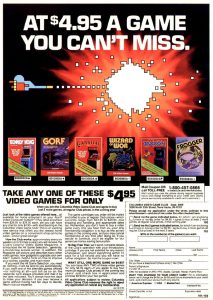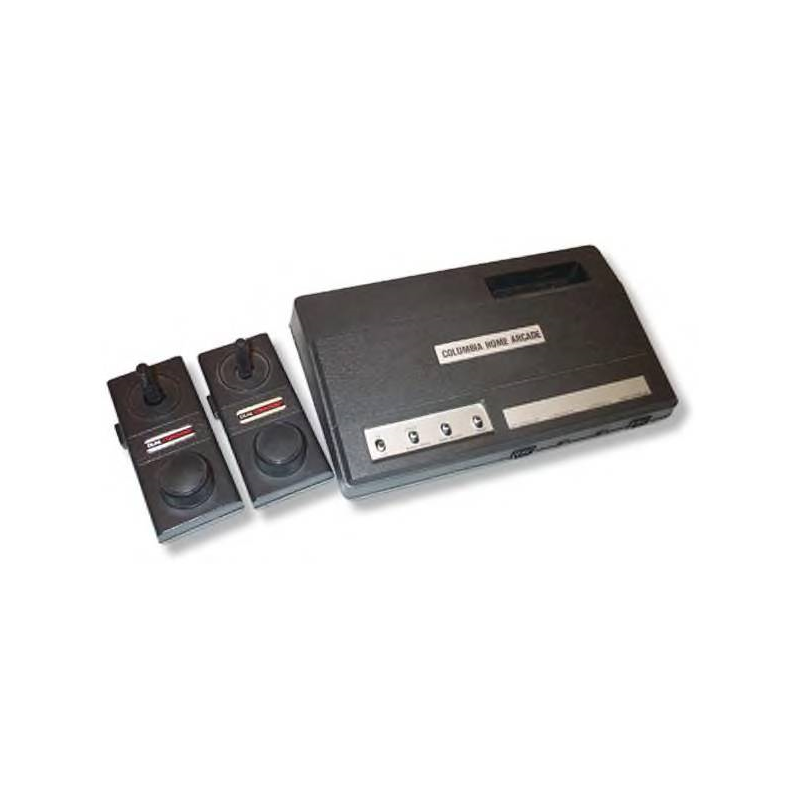|
|
|
History
The Columbia House brand was created in the 1970s by the Columbia Records division of CBS, Inc. as an umbrella for its mail-order music clubs. Columbia House then created their club where members would pick music media at a discounted prices under the promise of buying more at regular price later. In 1982, Columbia House decided to launch the “Columbia Video Game Club”, which would use the same principle but applied to video games. The club would offer games for the Atari 2600, the Atari Home Computers, the Colecovision/Adam, Apple, and the Commodore 64. Columbia House needed to sign distribution deals with various software company and to do so, they reached out to CBS Electronics, another company under the CBS umbrella. CBS Electronics had published several arcade adaptations and original titles for the Atari 2600, and other consoles and computers. They were also distributed all Coleco-related video game products in Europe. From there, Columbia House was able to signed distribution deal with a few software companies, including CBS Electronics.
Around the same time, Coleco informed CBS Electronics of a new video game console that was about to hit the market: the Coleco Gimini. The Gimini was an Atari 2600 clone that Coleco planned to release in 1983. It was based on their ColecoVision Expansion Module #1, which granted the ColecoVision ability to play Atari 2600 games. CBS Electronics though that would be a good fit for the Columbia Video Game Club and another deal was struck between Coleco and CBS, but this time, to provide them with their own rebranded version of the Coleco Gemini for it to be sold via the club : the Columbia Home Arcade.
But Atari had no intention to let this attack go unanswered. On December 8, 1982, Atari files a suit of 350$ million in U.S. District Court, Northern District of Illinois, Eastern Division against Coleco Industries, charging patent infringement and unfair competition under State and Federal law. Atari’s lawsuit sought a preliminary and permanent injunction against the manufacture and sale of Coleco’s Expansion Module No. 1 which was intended to allow Atari’s VCS compatible cartridges to be played on the Colecovision home video game unit. Atari claimed that the Coleco cartridge adapter infringed two basic video game pate nts held by Atari–U.S. Patent No. 4,112,422 covering motion objects commonly referred to as players, missiles or sprites and U.S. Patent No. 4,314,236 relating to digital generation of sound and noise especially suitable to video games. Coleco said it would file a counterclaim charging violations of antitrust law by Atari.
nts held by Atari–U.S. Patent No. 4,112,422 covering motion objects commonly referred to as players, missiles or sprites and U.S. Patent No. 4,314,236 relating to digital generation of sound and noise especially suitable to video games. Coleco said it would file a counterclaim charging violations of antitrust law by Atari.
Coleco countersued Atari for 500$ million alleging Anti-Trust and continued developing the Gemini. Atari quickly modified the filing to add both the Gemini and the Columbia House Arcade to the injunction. This didn’t stop Coleco to reveal the Gemini at the 1983 CES in February.
Although urban legend says that Atari lost in court, the reality is quite different. Coleco argued that they had made their expansion with off the shelves part and, as such, had not infringe on any patent. This was mostly true … mostly. One chip, called the TIA, which is a simple audio/video chip is the heart of any Atari 2600. The chip itself was indeed used in many different Atari 2600 clone, but always under the license of Atari. To go around the TIA, Coleco sourced a clone from another company, VTI, also known as VLSI Technology Inc. VTI also sold the same chip to Mattel for their 2600 compatibility module for the Intellivision console. Atari would have no problem proving the Coleco didn’t use off-the-shelf parts for the TIA and Coleco had no choice but negotiate an agreement with Atari. The 2600 was already end-of-life and Atari had move their focus on the 5200, so they didn’t really mind if Coleco wanted to create a clone as long as they were getting their cut. On March 11, 1983 . Atari and Coleco announced they had settled their lawsuits against each other. Under their settlement, Coleco could continue making and selling its ColecoVision Expansion Module No. 1 and also could ship it planned Atari 2600-compatible Gemini Video Game System. However, Coleco would do so as a licensee of Atari’s patents, and would pay a royalty to Atari.
At this point, both the Gemini and the Columbia Home Arcade were green-lighted to be sold.
Release
The Columbia Home Arcade was then supposedly offered to the members of the Video Game Club for $49.95. The console was packed in a brown box with label “CBS video game club” and came packed with a sealed copy of Donkey Kong. I say supposedly as no flyers advertising the Columbia Home Arcade was ever found. Some says that the consoles were given to employees instead while other speculate that the console was indeed sold for a very short period of time before the effect of the video game crash made it unsellable. In any case, the console was short-lived.
Demise
In the end, around only 10,000 units were manufactured, but it is possible that the unsold stock was destroyed.

